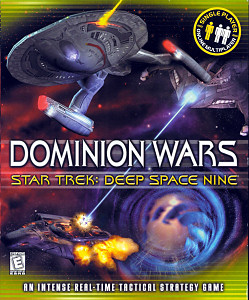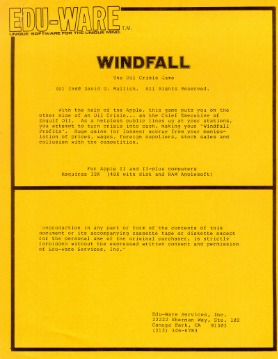
Jennifer Hale is a Canadian-born American voice actress. She is best known for her work in video game franchises such as Baldur's Gate, Mass Effect, Metal Gear Solid, BioShock Infinite, Metroid Prime, Halo, Overwatch, and Star Wars: Knights of the Old Republic. In 2013, she was recognized by Guinness World Records as the most prolific video game voice actor.
The NFL on CBS is the branding used for broadcasts of National Football League (NFL) games that are produced by CBS Sports, the sports division of the CBS television network in the United States. The network has aired NFL game telecasts since 1956. From 2014 to 2017, CBS also broadcast Thursday Night Football games during the first half of the NFL season, through a production partnership with NFL Network.

Star Trek: Deep Space Nine: Dominion Wars is a 2001 space combat/real-time tactics video game for Microsoft Windows developed by Gizmo Industries and published by Simon & Schuster. The game is based on the Star Trek TV show Star Trek: Deep Space Nine.

Itchy & Scratchy in Miniature Golf Madness is a side-scrolling action platform game and miniature golf game released on the Game Boy in 1994, featuring the cat and mouse pair Itchy & Scratchy from the American animated television series The Simpsons. Developed by Beam Software, it was the first game to feature these characters. In the game, the player controls Scratchy as he plays through a miniature golf course of nine holes while at the same time avoiding Itchy's attacks. It received generally mixed to positive reviews from critics.
Edu-Ware Services, Inc. was an educational and entertainment software publisher established in 1979 by Sherwin Steffin and Steven Pederson. It was known for its adventure games, role-playing video games, and flight simulators for the Apple II series of computers.

The NBA on CBS is the branding that is used for weekly broadcasts of National Basketball Association (NBA) games produced by CBS Sports, the sports division of the CBS television network in the United States. CBS aired NBA games from the 1973–74 NBA season until the 1989–90 NBA season.

The Prisoner is an adventure game for the Apple II published by Edu-Ware in 1980. It is loosely based on the 1960s television series The Prisoner and incorporates that show's themes about the loss of individuality in a technological, controlling society. The player's role is that of an intelligence agent who has resigned from his job for reasons known only to himself, and who has been abducted to an isolated island community that seems designed to be his own personal prison. The island's authorities will use any means—including coercion, disorientation, deception, and frustration—to learn why their prisoner has resigned, and every character, location, and apparent escape route seem to be part of a grand scheme to trick the player into revealing a code number representing the prisoner's reason for resigning. The game occasionally breaks the fourth wall by acknowledging that a game is being played.

Space is a text-based role-playing video game for the Apple II designed by Steven Pederson and Sherwin Steffin of Edu-Ware Services. It was one of the first science fiction RPGs to appear on personal computers. An expansion pack, Space II by David Mullich, was released in the same year.
Terrorist is a real-time, two-player strategy game developed by Steven Pederson of Edu-Ware Services for the Apple II and published in 1980. One player plays the government authority, while the other plays a terrorist organization in three scenarios: the capture of a building and taking of hostages, air piracy, and nuclear blackmail. Players make their moves at the same time through the use of game paddles. Winner and loser is judged by an elaborate scoring system based upon the government player's societal values and the terrorist player's goals.

Windfall: The Oil Crisis Game is a real-time business simulation game written by David Mullich and published by Edu-Ware in 1980 for the Apple II. Based upon queuing theory and released after the 1979 energy crisis, the game puts the player in the role of chief executive of Engulf Oil, setting gas prices and worker salaries, monitoring gas station lines, scheduling oil tanker arrivals, and negotiating oil prices with OPEC countries in a race against the clock to maximize profits. As with most Edu-Ware games, Windfall has an educational aspect, demonstrating the delicate balance in complex systems.

Crash Bandicoot Purple: Ripto's Rampage and Spyro Orange: The Cortex Conspiracy are two platform games published by Vivendi Universal Games. The games are developed by Vicarious Visions for the Game Boy Advance. They were released in North America on June 3, 2004, and in Europe on June 25, 2004 under the names Crash Bandicoot Fusion and Spyro Fusion.
Games held by the National Basketball Association (NBA) on Christmas Day, December 25, have been an annual tradition since the league's second season in 1947. Since 2008, five games have been played on Christmas. Unlike the National Football League (NFL)'s traditional Thanksgiving Day games, the NBA's Christmas Day games have no fixed opponents; rather, they feature some of the best teams and players. Since 1995, the current NBA champions play a game on Christmas Day.

High Fantasy is a fantasy role-playing game system originally published by Fantasy Productions in 1978. A second edition in 1981 and several subsequent books were published by Reston Publishing that featured solo adventures using the High Fantasy system. The game received mixed reviews in game periodicals including White Dwarf, The Space Gamer, Different Worlds, Ares, and Dragon.

The Butt Fumble was a notorious American football play from a National Football League (NFL) game played on Thanksgiving Day, November 22, 2012, between the New York Jets and New England Patriots.
The announcerless game was an American football contest played on December 20, 1980, between the New York Jets and the Miami Dolphins of the National Football League. As an experiment, the NBC television network broadcast it without assigning any commentators to cover it. The two teams were playing the last game of that season for them as neither had qualified for the playoffs, and since the game was being broadcast nationally NBC executive Don Ohlmeyer decided on the idea to boost what would otherwise have been weak ratings. The Jets won a 24–17 upset victory.

ABM is a clone of Atari, Inc.'s Missile Command arcade video game. It was programmed for the Apple II by Silas Warner and published by Muse Software in 1980, the same year as Missile Command.
As the national broadcaster of the NBA, CBS aired NBA games from the 1973–74 until the 1989–90 season, during which the early 1980s is notoriously known as the tape delay playoff era.
On December 14, 1988, CBS paid approximately $1.8 billion for exclusive television rights for over four years. CBS paid about $265 million each year for the World Series, League Championship Series, All-Star Game, and the Saturday Game of the Week. It was one of the largest agreements between the sport of baseball and the business of broadcasting.
In 1980, 22 teams took part in a one-year cable deal with UA-Columbia. The deal involved the airing of a Thursday night Game of the Week in markets at least 50 miles (80 km) from a major league park. The deal earned Major League Baseball less than $500,000, but led to a new two-year contract for 40-45 games per season.
NBC made history in the 1980s with an announcerless telecast, which was a one-shot experiment credited to Don Ohlmeyer, between the Jets and Dolphins in Miami on December 20, 1980), as well as a single-announcer telecast, coverage of the Canadian Football League during the 1982 players' strike, and even the first female play-by-play football announcer, Gayle Sierens.











